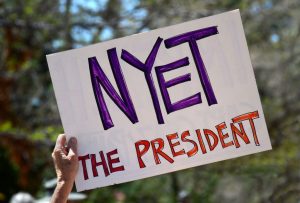The required summer reading for rising ninth graders at my son’s public high school in Brooklyn this year is a choice of the following: Unwind, a work of dystopian science-fiction by bestselling young-adult author Neal Shusterman; The Epic Crush of Genie Lo, a fantasy YA novel by F.C. Yee; and Punching the Air, a National Book Award finalist novel in verse, also YA, co-written by Ibi Zoboi, a Haitian-American author, and Yusef Salaam, a New York City councilman and one of the “Central Park Five”.
The choice of ephemeral, ideological, and genre fiction in the YA category for study in school isn’t rare. It plagued both of my kids throughout their private middle-school educations. And it’s shutting down debate and turning kids away from authentic learning.
When my daughter started at a different New York City public school three years ago, the entire incoming freshman class was assigned a piece of transgender agitprop for young adults titled The 57 Bus: A True Story of Two Teenagers and the Crime that Changed Their Lives. This book manipulatively told kids that their acceptance of transgender ideology was the key to preventing horrific crimes. Later that year, she was tasked with making serious exegesis on the differences between the Ursula K. Le Guin story “The Ones Who Walk Away From Omelas” and a rejoinder by woke fantasy writer N.K. Jemsin. As if a dystopia designed to prove a particular point provides meaningful evidence on human societies. This summer, an informal polling of my son’s group chat found one teen assigned a different Shusterman book by his school, and everyone else independently reading classics and books for actual adults (David Copperfield, The Devil in the White City, Dracula, the last with the notation “highly recommend to y’all it’s quite disturbing though”).
In an era of rapidly declining literacy and the decimation of education by artificial intelligence, schools that assign terrible YA literature are hastening the end of reading and critical thought. This isn’t just because of the obvious identity politics behind the choice of such books, though works like Punching the Air, from my son’s list, is stunningly anti-white for a book taught in a city public school. Even worse are the low quality and trite ideas, which actively repel kids from real learning.
To unpack these books a little: Shusterman’s Unwind, the best of the bunch, takes on the abortion issue. It’s set in a dystopian America, after a “second civil war,” called the Heartland War, in which Pro-Life and Pro-Choice forces have battled it out until reaching a terrible compromise: Abortion is illegal, but parents have the option to “unwind” their children when they reach their teens. What follows is a Hunger Games-ish adventure in which Connor, a young man whose parents have decided to unwind him, tries to escape his gruesome fate.
The book is fairly readable — Shusterman is a proficient mass-market fiction writer — and might appear to offer some grist for intellectual discussion. One can imagine a classroom debate on the similarities and differences between ending a child’s life at 13 versus ending it in utero. But this is lazy, simplistic, and not fit for a classroom. We don’t kill and dismember our own children at 13; a world in which we did would be monstrous and unrecognisable. So how useful is the comparison, really, in shedding any light on the issues at play in the abortion debate? The book employs the same technique that’s currently degrading the public discourse, in which egregious analogies are used to win moral arguments. Ideally, kids in school would learn to not think this way.
Shusterman may be intending to stir up controversy, but a pro-life message is not really his intention, either — if it were, the book likely wouldn’t be taught. His ultimate point is to suggest that both sides of the abortion issue are deranged, and that no one really knows the right or wrong of it. It’s an appropriately feel-good answer for a work of popular fiction but offensively bland and incurious for academia. A school would ideally have the history of human thought, scientific debate, and moral and religious philosophy to draw upon in addressing the complexities of abortion. Instead, they’re teaching kids that it doesn’t really matter and there’s nothing to learn here, using a clumsy analogy from a fantasy world as evidence.
The Epic Crush of Genie Lo is less ambitious — so unambitious, in fact, that Asian representation seems to be the only possible reason for its choice as a school book. This is a novel in the Harry Potter model, in which Genie, an ordinary overachieving Asian high schooler in the Bay Area, discovers that she is the reincarnation of Ruyi Jingu Bang, a demon-fighting entity from Chinese mythology. The demon-fighting plot is tedious, the love interest cliché (“He had the cheekbones and sharp jawline of a pop star…”), and to the extent that there’s a larger message, it’s about Genie’s personal development — she has to live up to her enormous powers, and accept the fact that even being a superhero might not get her into Harvard.
The book is boring and badly written, has no aesthetic value, and could easily give children tasked with it the impression that they don’t like to read. Its fantasy world also engages in a relentless, charmless flattening of human history and human experience, with deities whipping out cell phones and banter along the lines of “You died and then came back to life, get with the program.” Resurrection, Chinese gods, ho hum. How about introducing kids to some of the Chinese source material for these legends, or any of China’s wondrous and strange classics instead?
And then there’s Punching the Air, another deeply manipulative book lent moral authority through its affiliation with Yusef Salaam’s story. In it, a sweet, innocent, mother-loving black art student named Amal is falsely accused of beating a white teenager into a coma, and then is convicted and sent to juvenile prison. The free-verse construction allows it to be atmospheric and vague about the details — such as who actually beat up the white kid — yet rich in implication. Amal is an “old soul,” doomed before he was born by his skin colour, and traveling a “Pipeline” (one of the poem names) from slave ship to prison. “White Space” and “Blind Justice” (two more poem names) are to blame. The level of the analysis of these incidents can be demonstrated by a representative poem: “All because/ we were in the wrong place/ we were in the wrong skins,” contrasting with “All because/ they were in the right place/ they were in the right skins.” And so on. The book ends with Amal meeting a prison abolitionist and hoping to be exonerated.
It’s difficult to determine whom the book wrongs more — black kids, being presented with this bleakly deterministic future, or their white peers, the monolithic enemy. It surely fails to represent the lively and interactive race climate in Gotham schools, in which blackness and black culture are the arbiters of cool, and it’s downright ludicrous to imagine a group of affluent white kids kicking a group of black kids off a playground, as is the case during the book’s inciting incident. It also freely traffics in the glamorisation of prison life that’s popular with young readers of all races. Amal makes beats in prison — of course he does. The school should interrogate the mythology of the prison-to-rap-star pipeline, not promote it.
The real victim, however, is academic rigour. These books’ arguments are lazy, and they present sacred cows that kids know they can’t argue about anyway. There is nothing in them to inspire children or draw them into the world of reading. Most students assigned them will ChatGPT the summary instead — and honestly, they won’t be missing anything.
a.appcomments {
background: #FFF;
border: 1px solid #446c76 !important;
font-family: benton-sans,sans-serif;
font-weight: 600;
font-style: normal;
font-size: 12px;
color: #446c76 !important;
padding: 12px 50px;
text-transform: uppercase;
letter-spacing: 1.5px;
text-decoration: none;
width: 100%;
display: block;
text-align: center !important;
}



















